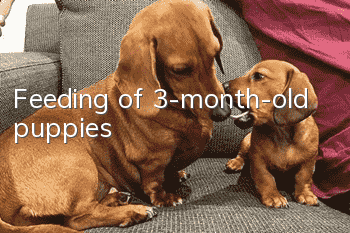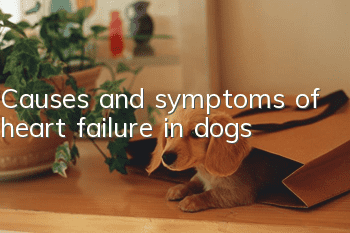Feeding of 3-month-old puppies

During the growth and development stage, all parts of the puppy's body do not grow in a balanced manner. From birth to 3 months, the body mainly grows and gains weight. Therefore, the feeding of the dog during this period is very critical, and the dog is also very important during this period. Once healthy, the main thing is to carry out a series of training for the dog.
Food: Feeding time should generally be arranged during the day, which is suitable for the general activity patterns of animals. For example, three meals a day, breakfast around 8:00, lunch around 1:00, and dinner around 6:00. The composition and quantity of food are basically the same as those at 2 months old. Since dogs grow up day by day, the portion size should be increased appropriately. Generally, every 3 to 5 days, the original amount can be increased by about 1/5.
Generally, the size and thickness of the leg bones of a puppy when they grow up are related to genetics, while the amount of food eaten has little to do with nutritional status. During the growth and development stage, each part does not grow in a balanced manner. For example, from birth to 3 months old, the body and weight mainly grow, at 4 to 5 months, the body length mainly grows, and after 7 months, the body height mainly grows. Therefore, special attention must be paid to both balanced nutrition and sufficient nutrients during the growth and development period. If your dog eats too much, it will easily hurt his stomach and affect his gastrointestinal function. If you eat too little, you cannot ensure the nutrients necessary for the growth and development of the body. The body will become thin and have poor resistance. It will be more dangerous once you get sick. Dogs in the growth and development period generally need balanced and nutritious food (solid or semi-liquid food). The daily feeding amount is about 60 to 70 grams per kilogram of body weight, divided into 3 to 4 meals.
Excretion: Eat three times a day and defecate about three times a day. Dogs sometimes urinate out of joy or fear, which is a sign of emotional or nervousness. It is generally difficult to control, but it can disappear naturally after adulthood.
Education: Provide basic education to puppies and educate them on developing good eating habits. Do not let your dog play while eating. If she suddenly stops to play while eating, you can take away her food and wait until the next feeding time to let her eat. If she eats well, you can praise her. Be gentle with your dog and don't scold him excessively.
Health: monthly health examination, urine and feces tests. Regular deworming
Preventive injection: After the vaccine is injected at the age of 2 months, due to the incomplete development of the immune mechanism of the body, the immunity produced is insufficient, and repeated injections are required to enhance the body's immunity. When puppies reach 3 months of age, they must be vaccinated against rabies. This is a stipulation of dog-raising laws. It is also a right for the dog, and it is an obligation for the owner to fulfill the dog.
Special note: 3-month-old dogs tend to pick up random things from the ground and sometimes unexpected things enter her stomach, such as buttons, pebbles, needles, nails, and plastic. These foreign bodies can easily damage the gastrointestinal mucosa or cause intestinal obstruction. When a dog is found to have severe vomiting and abdominal pain, an X-ray examination should be considered. If obstruction is determined, surgery and other measures should be taken promptly.Do this, otherwise life may be in danger.
- What happens when a mother dog bites her baby?
- Daily behavior training for Pug dogs, Pug dog training methods!
- Dog Arthritis Symptoms
- Are Australian Shepherds aggressive?
- What are the key points for raising Caucasian dogs?
- Dog food taboos: Dogs must not eat these things
- How much does a Mastiff cost and is it easy to train?
- These three common vegetables and foods at home must not be eaten by small dogs.
- Basic knowledge about dog allergies
- How to raise golden retriever puppies for beginners



